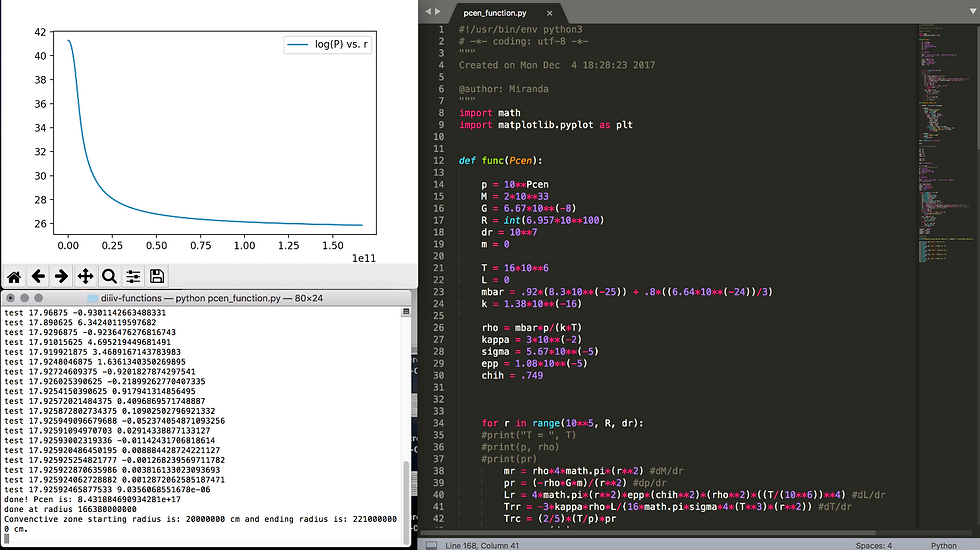Pulsation in Low Mass Stars and Protostars - Andy Cohn 15F
- Dmitry Pepper

- Jan 5, 2021
- 4 min read

Tell me about your DIV III project!
My DIV III is going to be coming up with a programming model to follow the birth and evolution of a very low mass star. And see if it shows sort of pulsing behavior, changes in brightness and changes in size. Not just over time, but regularly.
What inspired you to do this project?
I read some really boring papers and got confused because they used a lot of big words I didn’t know I brought the papers to my advisor. And he was like “that’s interesting…I didn’t know stars could do that.” I got curious about it and here I am. Really [the scientists] were expecting you going into the paper having read most of their other works. It was not too many big words. It was the paper that expected you to know what they were talking about. I still kind of don’t, but I can get the general concept.
Back in the 70s, their telescope weren’t biggest enough. Today we have much better telescopes than what we did back then. They had identified eight or ten total red dwarf stars. We have thousands out there we can look at. They had so little data and we have so much data. It’s still such an interesting field. We went from having next to no observations to having uncountable observations. There is so much space out there.
What is your favorite part of your project?
The things I like best is that I keep getting more and more questions about stars. I don’t think I’m going to finish all of it because there are a lot of factors that go into modeling a star. A lot of things that can go wrong which may give me a different result. Even the things I am doing are all models we have guessed at. It’s tricky. Hopefully, if I throw enough math at it something will pop out. There is so much to learn. You can keep going and going and learning more and more stuff. No matter what, you are not going to get to the end of it because there is no end. You can never know there is everything to know about stars, nobody can.
Below is a glimpse of the intricate coding involved in Andy's project.

How long have you been interested in this field of study?
In astrophysics in general, I’ve been interesting since my junior year of high school. This subfield of stellar astrophysics, only a couple of months. I only really settled what my DIV was going to be a few weeks into the semester.
I took a class on it, I took an Intro to Astrophysics class with a really cool teacher who encouraged our learning and helped teach all sort of cools things.
Where are you from?
Bay Area, California. Not as warm as everybody thinks. It doesn’t get down to snowing-cold, but it doesn’t get down to freezing cold. I don’t like the winters there. It gets gross and bland and overcast all the time. Nowhere is insulated as well because we don’t need it. It gets hotter out here sometimes. There it’s just dry all year round. I do like the summers there.
How did you find Hampshire?
One of the high school’s college assistant people who helped us figure out where to apply. I don’t know how she found Hampshire. She found it and pointed it out to me. And it seemed like a really good fit. During spring break, me and my dad visited the East Coast and visited seven colleges and Hampshire was one of them. There was some college I really didn’t like. We did a lot in Massachusetts. I did go to Smith and Mount Holyoke.
How have you liked Hampshire?
I’ve loved it. The people here are just amazing. The teachers are super cool. Love the narrative evaluations. I’ve made so much more progress in my learning and in my life than I would have if I just got letter grades for everything single class. It’s just nice being in a liberal arts school and meeting so many different kinds of people. Even the ones who do study similar things to me, It’s so easy to find things that are interesting to talk about because we really want to be here studying what we study.
How does it feel to know you’ll be graduating next semester?
Absolutely terrifying. I can’t wait. I can’t wait to see what's happening. It’s terrifying to think being outside of the school system where I’ve been for the past 18 years of my life. It’s going to be really exciting to move on.
What are your plans after college?
No idea. I’m probably going to take a gap year and going to grad school. During the gap year I hope to get an internship or job. Most applications haven’t opened up [for grad school]. I’ll probably be doing to Astrophysics but I have no idea where I’ll be going.
Some words of wisdom to future Hampshire students?
Be less scared of math. Because we have a really cool math program here and so many people get scared away by high school which I agree is horrible. Math doesn’t have to be like that. It’s not just hammering proofs and solving problems on test. It’s figuring out puzzles.




Comments